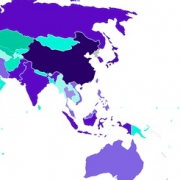Leaders Education During Humanitarian Crisis: Aid & International Development Forum 2011, Day Two
At the last workshop session of the AIDF 2011, international educators gathered to share lessons learned about education during humanitarian crises. The synthesis and common ground between the presenters was clear—education should continue in full force during humanitarian crises, and ICTs can help that happen.
Citing statistics that crises can last for decades during war-prone areas, the presenters repeatedly emphasized the need for education to continue despite the common excuse that “now’s not the time.” Given that we don’t know when crises will end, education should begin as soon as possible and continue during humanitarian crises, they argued. Additionally, the presenters explained that when education stopped, nations lost enormous amounts of human capital, which is essential to overcome crises in the future. Limiting education during crises, then, creates a poverty trap due to a lack of human capital.
Some of the best ways to continue education during a crisis include utilizing ICTs. Distance learning, accessing Open Educational Resources (OER) online, and radio-based educational programs all become increasingly relevant during crises.
Panelist Fred Mednick, of Teachers Without Borders, spoke on the importance of local cultural contexts in educational models. During natural disasters or military crises, international educators often forget about the ever-present cultural context that they must take into account in their curriculum and approach. This lessens the impact of their efforts.
Sergio Ramirez-Mena, Senior Program Director at AED’s Global Education Center, highlighted partnerships between NGOs, governments, and businesses to provide schools and education during humanitarian crises. The collaboration with businesses is especially innovative during a crisis, and, given that many crises extend for years, is quite helpful in terms for financial sustainability of programs, bridging the gap between humanitarian and development efforts.
Last, Lori Heninger from the Inter-Agency Network for Education in Emergencies, discussed the need for collaboration between organizations in the humanitarian education space. The materials are out there, thanks to the rise in OER, Heninger explained, but getting the right information to the right people is a pressing challenge.






































